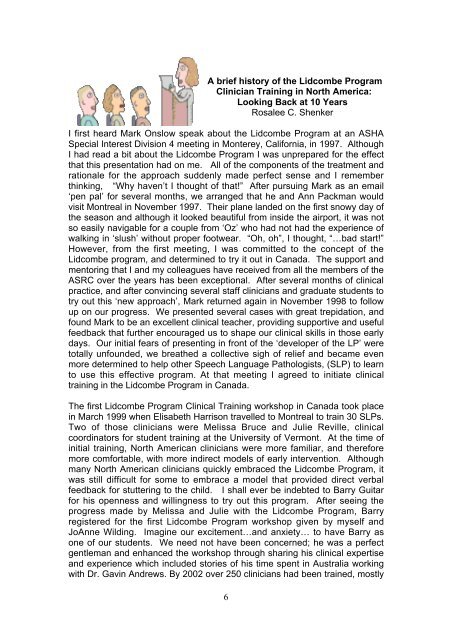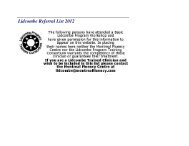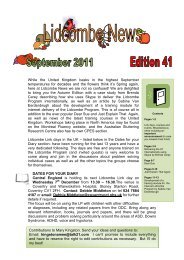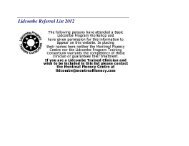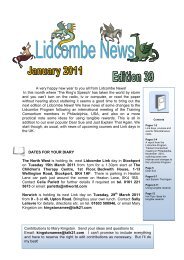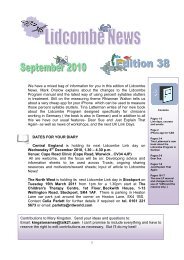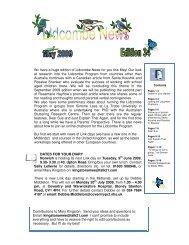Lidcombe News Edition 31st - Montreal Fluency
Lidcombe News Edition 31st - Montreal Fluency
Lidcombe News Edition 31st - Montreal Fluency
You also want an ePaper? Increase the reach of your titles
YUMPU automatically turns print PDFs into web optimized ePapers that Google loves.
A brief history of the <strong>Lidcombe</strong> Program<br />
Clinician Training in North America:<br />
Looking Back at 10 Years<br />
Rosalee C. Shenker<br />
I first heard Mark Onslow speak about the <strong>Lidcombe</strong> Program at an ASHA<br />
Special Interest Division 4 meeting in Monterey, California, in 1997. Although<br />
I had read a bit about the <strong>Lidcombe</strong> Program I was unprepared for the effect<br />
that this presentation had on me. All of the components of the treatment and<br />
rationale for the approach suddenly made perfect sense and I remember<br />
thinking, “Why haven’t I thought of that!” After pursuing Mark as an email<br />
‘pen pal’ for several months, we arranged that he and Ann Packman would<br />
visit <strong>Montreal</strong> in November 1997. Their plane landed on the first snowy day of<br />
the season and although it looked beautiful from inside the airport, it was not<br />
so easily navigable for a couple from ‘Oz’ who had not had the experience of<br />
walking in ‘slush’ without proper footwear. “Oh, oh”, I thought, “…bad start!”<br />
However, from the first meeting, I was committed to the concept of the<br />
<strong>Lidcombe</strong> program, and determined to try it out in Canada. The support and<br />
mentoring that I and my colleagues have received from all the members of the<br />
ASRC over the years has been exceptional. After several months of clinical<br />
practice, and after convincing several staff clinicians and graduate students to<br />
try out this ‘new approach’, Mark returned again in November 1998 to follow<br />
up on our progress. We presented several cases with great trepidation, and<br />
found Mark to be an excellent clinical teacher, providing supportive and useful<br />
feedback that further encouraged us to shape our clinical skills in those early<br />
days. Our initial fears of presenting in front of the ‘developer of the LP’ were<br />
totally unfounded, we breathed a collective sigh of relief and became even<br />
more determined to help other Speech Language Pathologists, (SLP) to learn<br />
to use this effective program. At that meeting I agreed to initiate clinical<br />
training in the <strong>Lidcombe</strong> Program in Canada.<br />
The first <strong>Lidcombe</strong> Program Clinical Training workshop in Canada took place<br />
in March 1999 when Elisabeth Harrison travelled to <strong>Montreal</strong> to train 30 SLPs.<br />
Two of those clinicians were Melissa Bruce and Julie Reville, clinical<br />
coordinators for student training at the University of Vermont. At the time of<br />
initial training, North American clinicians were more familiar, and therefore<br />
more comfortable, with more indirect models of early intervention. Although<br />
many North American clinicians quickly embraced the <strong>Lidcombe</strong> Program, it<br />
was still difficult for some to embrace a model that provided direct verbal<br />
feedback for stuttering to the child. I shall ever be indebted to Barry Guitar<br />
for his openness and willingness to try out this program. After seeing the<br />
progress made by Melissa and Julie with the <strong>Lidcombe</strong> Program, Barry<br />
registered for the first <strong>Lidcombe</strong> Program workshop given by myself and<br />
JoAnne Wilding. Imagine our excitement…and anxiety… to have Barry as<br />
one of our students. We need not have been concerned; he was a perfect<br />
gentleman and enhanced the workshop through sharing his clinical expertise<br />
and experience which included stories of his time spent in Australia working<br />
with Dr. Gavin Andrews. By 2002 over 250 clinicians had been trained, mostly<br />
6


